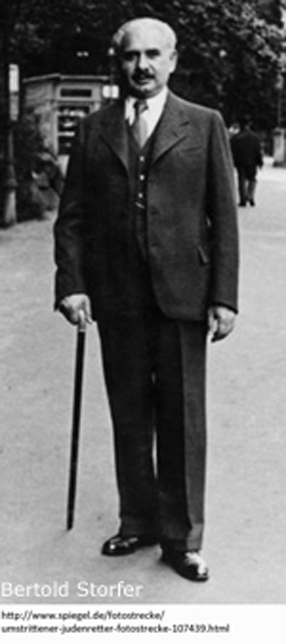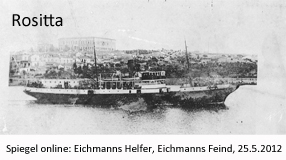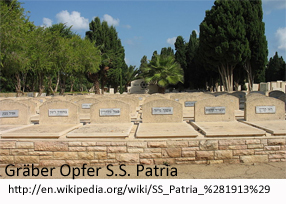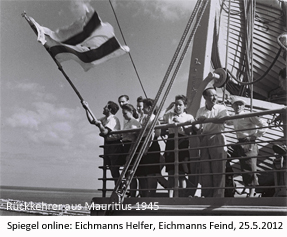 |
 |
 |
 |
 |
 |
 |
 |
In 1939 in Vienna several refugee organizations were located. Until 1941, the Nazis wanted to make Germany free of Jews by displacing them. Therefore, they sent Adolf Eichmann to Vienna where he established the “Zentralstelle für jüdische Auswanderung”, an organization which issued exit permits very efficiently. But Eichmann had to deal with the issue that the Jewish people couldn’t leave Germany since countries all over the world closed their borders on Jewish refugees.
This was also true for Palestine. After a general strike by the Arabs of six months duration in 1938, the British Government changed its policy and decided in May 1939 to make immigration to Palestine more or less impossible by the so called Whitepaper. Thereupon some organizations were established, geared at organizing illegal transports to Palestine. One of them was the HaMossad (Mossad le Alija Bet), an organization that had close relations to the Jewish labor movement. And there was Bertold Storfer, a former successful salesman with a huge network. The Kultusgemeinde (the Austrian Jewish community) chose him to organize the transports because the Kultusgemeinde had to guarantee the departure of a certain number of Jews.
The Nazis wanted to have control over the illegal immigration to Palestine. On the one hand they wanted to get rid of the Jews, on the other hand they didn’t want to strengthen a Jewish state. By controlling all transports, they could make absolutely sure that only old and ill people as well as non- Zionists were on the transports.
Eichmann trusted Storfer and therefore from 1939 onwards, he got more and more competences. In 1940 he was in control of all transports from Germany and all occupied areas to Palestine but was himself subject to a strong control by the Eichmann organization.
The Jewish organizations mistrusted Storfer, considering him a collaborator. The HaMossad considered him also a competitor (e.g. for scarce ships in the Mediterranean) and hated him because of his control. But because several organizations had to withdraw their European representatives in 1939, they didn’t notice Storfer’s rise to power. Throughout 1939 and 1940 they underestimated his power and thus were not aware that without him supporting them they were not able to do anything at all.
In September 1939 Storfer started an operation which should become his biggest. He saved 3,500 lives.
The transport was to start in Preßburg (today Bratislava, the capital city of Slovakia) and go via the Danube to the Black Sea. There, the refugees were to change ships and sail to Haifa.
Storfer found an ocean-going ship and could buy it in Mid-December1939 from a Greek shipping company. The purchase price was to be paid by the end of November by the Kultusgemeinde, but was not paid in time. For the journey on the Danube, Storfer had a contract with the DDSG, the Danube Shipping Company. A ship was to be provided on November 11, 1939 in Preßburg. Storfer sent his refugees to Preßburg but winter came earlier than expected and thus it was no longer possible to sail on The Danube. During Christmas the refugees got another terrible news. The Greek ship had sunken.
The refugees were predominately detained in a round-factory, called the Patronka where they suffered the hardest winter in the century. The circumstances in the Patronka were unbearable. The refugees slept on straw which often was wet because the roof was broken. The windows were also broken or even didn’ exist. And there were only a few wood-burning-ovens. The refuges had to pay for their living. In spring the situation slightly improved. The guard was loosened and the refugees were able to leave the camp once in a while. Some even had occasional jobs. The windows were fixed and wooden-beds were made.
Apart from the Patronka there was the Slobodarna, a hotel in which the circumstances were unworthy as well and the guard was even tighter. Only approximately 50 refugees from Danzig were lucky enough to learn on time that the ship had sunken and stayed in Danzig.
Storfer had to purchase a new ship but he had no money. The sunken ship was covered by insurance but it would still be several months until the money would be paid out by the insurance company.
The Kultusgemeinde also ran out of money. Therefore, Storfer approached JOINT, an American organization which collected money to help the European Jews. It promised to provide the money needed and at the beginning of March 1940 the Greek ship-owner-company found new ships for Storfer. The money was to be paid by the end of March, but it wasn’t paid on time. When the money was eventually provided a few weeks later, the HaMossad had already seeded outs doubts at JOINT as to the trustworthiness of Storfer. Anyway, the JOINT was not enthused about the illegal immigration to Palestine since the Zionist movement as a whole was torn between protests against the Whitepaper-policy and the whole-hearted support of Great Britain against Nazi-Germany. So it was easy to seed more doubts. A signature of a certain person became necessary to get the money out. This person demanded to get the name of the ship, to see the contracts and to visit the ship. Storfer found out that this person didn’t belong to JOINT but to HaMossad, his competitor. Therefore Storfer refused to comply. In the meantime the Greek ship owner company had received better offers for his ships and became so angry about the missing money and the bullying that he dissolved the contracts.
Storfer tried several times to negotiate with the HaMossad. He hoped to get more acceptance at the Jewish organizations. But in January 1940 the negotiation ended up in a huge argument. In March 1940, the HaMossad thought it could purchase a Turkish ship thus being no longer dependent on Storfer. But Turkey entered World War II subsequently and prohibited the sale of Turkish vessels. It is not clear if Storfer decelerated the deal, but it is documented that he was gleeful. In late summer he asked the HaMossad to help with the illegal landing in Palestine. But the HaMossad refused, since Storfer could not take on board several thousands of refugees of the HaMossad.
In Preßburg the situation became more and more precarious. Storfer had to pay for the detention camp, the food and the custody but he had no money. And the government of Slovakia- which was controlled by the Nazis- threatened Storfer with sending the refugees back to Germany at the end of May.
Finally JOINT gave the money free but a new problem arose. The money was transferred via Dutch banks. In the meantime, this country had also been annexed by Nazi-Germany and the Dutch ambassadors all over Europe forbade to pay out Dutch money. It lasted months to get the money free. For some Jewish refugees this had terrible consequences: To pressure Storfer, the Eichmann organization had freed some captives of concentrations camps under the obligation of a fast departure. Now that the deadline had run out, these refugees had to be sent back to the concentrations camps.
The Greek ship-owner-company found four old freighters (Milos, Pacific, Atlantic, Rosita) for Storfer but since April the prices for food, materials, coal, the crew salaries and insurance had increased rapidly. New money had to be organized. The Kultusgemeinde was willing to provide the money but made Storfer accept much more refugees on the transport in return (3,500).
The DDSG also pressured Storfer. On September 10, 1940 it needed the ships for another Nazi-operation. The transport from Preßburg to the Black Sea had to be done before. But the Greek ships were not ready yet.
On September 3 Storfer let the ships start in Preßburg. 3,500 people traveled on 4 pleasure boats. The DDSG also forced the Greek ships to Tuleca, a very small harbor-town in Rumania where it was not possible to buy the necessary materials to fit them out. They had to be brought in from Greece, which caused another delay.
Another delay of several weeks was caused by Storfer having bought Spanish flags, but Spain later withdrawing the permission. Therefore the Greek crew couldn’t leave Greece and got no visa for Romania. Finally Storfer bought Panamaian flags for the transfer which increased the costs a lot and caused another delay.
Because of all the delays the Greek ship-owner-company lost the crew two times and had to hire new ones. On the way to Romania the third crew was informed by the British government that the journey would be dangerous and illegal. After that, the ship owner had to increase the crew members’ salaries to three times the normal amount, but nevertheless lost 1/3 of the crew.
Another problem was that the exit permits of the refugees were expired and had to be renewed.
The refugees caused huge problems in Tulcea because the town was too small for so many people. Drinking water and food became short and extremely expensive. The people of Tulcea were very angry and complained to the Rumanian government.
The situation on the ships was also terrible, especially on the MS Atlantic. Therefore the refugees complained already before departure and demanded that some of the refugees should be reloaded to the fourth ship which was awaited in Tulcea but was still not there. Storfer didn’t react. Therefore the refugees addressed their complaints to the Romanian government. Storfer became very angry because he feared that the Romanian government would withdraw the exit permit. Storfer ordered that all ships had to sail immediately. The ships sailed on October 8, although the preparations were not finished yet. This caused immense problems especially for the Atlantic. The ship had been provided with too little food, drinking water and coal.
In Iraklion the problems became critical. The ship-owner had transferred money to Crete for coal and food but because Nazi-Germany had attacked Greece the money hadn’t arrived. And when the crew learned that the war had broken out in Greece, the crew members became nervous because of the increasing danger. Again they went on strike and even threw a huge part of the rest-coal into the sea.
Thereupon the tour guides imprisoned the captain and sailed on with a rest crew and the help of some passengers. When they ran out of coal they tried to reach Cyprus but they had to use everything which burned for fuel (pylons, beds, everything). Finally the British navy had to tow them. In Limassol the passengers had to give away all their assets and jewelries to buy coal. Typhus broke out.
In October the British Colonial Office learned that the three ships were on the way to Haifa, carrying thousands of refugees. Under the pressure of the new flow of refugees the British Colonial Office decided to deport all illegal refugees to British Colonies far away from the Middle East in the future. And they also decided to make an example of the 3 ships from Tulcea by deporting all passengers to Mauritius. On November 14 the MS Pacific and the MS Milos were picked up before Haifa by the British Navy and were escorted to Haifa. The passengers were transshipped to the S.S. Patria, a troop transporter – officially for quarantine reasons. But coal was loaded and other preparations were made for sailing. Therefore very soon rumors about a deportation came up. On November 16 the passengers chanted in unison, demanding their release and crying for help to their relatives on the quay. Petitions were sent to the British Colonial Office, but to no avail.
On November 24 the MS Atlantik finally reached Haifa and the authorities started immediately to reload the passengers to the S.S. Patria. The sailing was imminent. In this situation the Jewish Zionist underground movement “Haganah” fixed explosives to the ship in order to sabotage the deportation. In the morning of November 25 the passengers were warned, but the ship exploded long before all passengers could leave. And because the necessary amount of the explosives was miscalculated the explosion was too big and the ship sank within 15 min. 267 passengers died.
The people who survived, where brought to a detention camp in Athlit (12 miles south of Haifa). The 1,584 passengers from the MS Atlantik who were not yet on the S.S. Patria were brought to another ship and transported to Mauritius where they lived in a detention camp in a former prison under terrible circumstances until August 1945. The passengers from the S.S. Patria were also to be deported, but were allowed to stay due to heavy protest in the US and a protest by Dr. Weizmann to Winston Churchill.
This transport was the last transport from Germany. In 1941 the Nazis changed their policy from displacement to extermination. Jews were not allowed to leave Germany any longer.
References:
Dalia Ofer: THE RESCUE OF EUROPEAN JEWRY AND ILLEGAL IMMIGRATION TO PALESTINE IN 1940-PROSPECTS AND REALITY: BERTHOLD STORFER AND THE MOSSAD LE'ALIYAH BET, Oxford Journal,
http://jewishtraces.org/wp-content/uploads/2012/02/OXFORDJOURNAL.pdf
Gabriele Anderl: ‘Entweder ihr verschwindet über die Donau, oder in der Donau’ Die Flucht österreichischer Juden nach Palästina, http://judeninkrems.at/gabriele-anderlentweder-ihr-verschwindet-uber-die-donau-oder-in-der-donaudie-flucht-osterreichischer-juden-nach-palastina/



